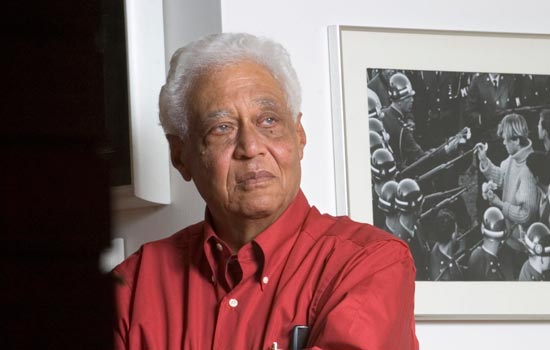A tribute to photojournalist and alumnus Bernie Boston
by Therese Mulligan
Submitted by Rich Cooley/Northern Virginia Daily
Portrait of Bernie Boston with his iconic photograph, Flower Power, in the background.
Bernie Boston ’55, the photojournalist who twice was honored as a Pulitzer Prize nominee, died on Jan. 22, at his home in Bayse, Va.
Throughout his 40-plus year career, Boston instinctively understood that photographic reportage was synonymous with picturing history.
As a young staff photographer with The Washington Star in the late 1960s, he was dispatched to capture the personalities and events of the Civil Rights and anti-Vietnam War movements. His memorable images gave voice to an important period in American history, including portraits of civil rights leader Martin Luther King Jr., his wife Coretta Scott King, and the Poor People’s Campaign marchers.
While attending an anti-war demonstration outside the Pentagon in 1967, Boston seized upon a dramatic scene of a standoff between a rifle-bearing National Guard detail and youthful activists with flowers. He once remarked, “I knew I had a good picture.” The resulting “good picture,” known as Flower Power, is today considered a cultural icon, a pictorial touchstone of young Americans’ newfound influence in shaping political and social opinion.
For much of his career, Boston served as a White House photographer, first with The Washington Star and later for the Los Angeles Times. He photographed every seated president from Lyndon Johnson to Bill Clinton, providing an insider’s view of the momentous and everyday events informing a president’s tenure in office. But as a photojournalist, Boston concerned himself with more than the politically famous and socially influential.
Upon retirement in 1993, he, along with wife, Peggy, bought and operated a regional Virginia newspaper, the Bryce Mountain Courier. As publisher and photographer, Boston chronicled the small town rhythms of the rural community in the Shenandoah Mountains he called home. Whether it was the national or local stage, Boston was the consummate photojournalist, eager to “tell” a story by capturing its most crucial human element, as in Flower Power. Similarly, he was always enthusiastic to share his experiences and knowledge with others, especially students and faculty in RIT’s School of Photographic Arts and Sciences.
Few who met Boston will ever forget his boisterous laughter and love of spinning a tale; his ever-present cowboy boots and the camera slung over one shoulder, always at the ready. He lived a life filled with passion for pictures and for the ways in which pictures can inform and inspire life itself.
An archive of his distinguished work, established by Boston and his wife, Peggy, at the RIT Archive Collections in 2006, serves as monument and encouragement to succeeding generations of photographers for whom pictorial journalism is a significant form of enduring cultural and human expression.
Mulligan is a professor in RIT’s School of Photographic Arts and Sciences and director of SPAS Gallery. This column presents opinions and ideas on issues relevant to higher education. To suggest an idea for the column, e-mail newsevents@rit.edu.













